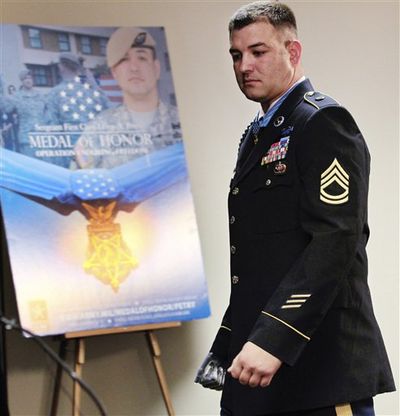Medal of Honor recipient welcomed back in Washington

JOINT BASE LEWIS-McCHORD, Wash. — After a week in which he was awarded the Medal of Honor at the White House and feted by the New York Mets and Broadway, Sgt. 1st Class Leroy Petry is eager to get back to his day job: taking care of wounded Special Forces members and their families at Madigan Army Medical Center in Washington state.
But he knows he has a bigger role to play right now, he said Tuesday.
“People look at you different,” he said of the medal. “Your voice is heard a lot more, so if there’s things that are wrong, or concerns of the lower enlisted, I have an easier way into the ear of those who can change things. If I can influence other lives, my goal … is to help out the best I can.”
Petry, the second living Medal of Honor recipient from the wars in Iraq and Afghanistan, earned the award by grabbing an enemy grenade during a fight at a compound in eastern Afghanistan in 2008. As he tried to throw it, the grenade blew his hand off, but his actions saved his own life and the lives of two comrades.
The 31-year-old Santa Fe, N.M., native was also shot through both legs during the fight.
The first living, active-duty service member who fought in Iraq or Afghanistan to get the Medal of Honor was Staff Sgt. Salvatore Giunta, who received the honor last fall for his actions chasing down the Taliban in Afghanistan in 2007.
Petry, wearing the medal around his neck, spoke with reporters at Joint Base Lewis-McChord south of Seattle on Tuesday. He said he and his family returned from their trip east Monday night, and his neighbors in Steilacoom gave them a warm welcome. Children made banners and cheered for them as they drove up.
He showed off his prosthetic hand, using it to make a fist and pick up a glass of water. He can remove the hand in favor of attachments that fit a golf club or a set of cutlery knives, and he takes it off every night and charges it like a cell phone. He’s never been much of a golfer, he said, but once he learned about the golf attachment, he figured it was a good time to take up the sport. He plays at a local Veterans Administration nine-hole course that wounded service members can use for rehabilitation.
“When I lost the hand, I thought I was going to have a hook,” he said. “The technology for prosthetics and medical care in general has just blown my mind away.”
It rotates 360 degrees at the wrist. “I don’t use it too much, but the kids get a kick out of it,” he said.
That quality of medical care has prompted one of his top priorities for the near future: visiting medical schools with his doctor and urging students to join the military.
He doesn’t expect to return to work at the Special Operations Command’s Care Coalition, where he helps arrange logistics and provides emotional support for wounded service members and their families, until October. His job there has helped him heal himself as much as anyone else, he said.
“It’s that soldier brotherhood, a little bit of competition, pushing each other to do better,” he said. “There’s a lot more severe injuries out there that you feel humbled that you got dealt the hand you got dealt. To see their bright attitude and their resiliency and all those service members recovering is just phenomenal.”
He said he hopes to make another visit to troops in Afghanistan sometime soon, as he did last year.
And he shared a tip he learned from the president.
“He was signing the citation, and I noticed he was left-handed,” Petry recalled. “I was looking over his shoulder, and I said, ‘I’m newly left-handed. How do you write without smudging all over your hand? He showed me, either angle high or, he said, ‘If it’s something important I’ll put a piece of paper down, or a napkin.’ So he gave me that insight into the left-handed community.”